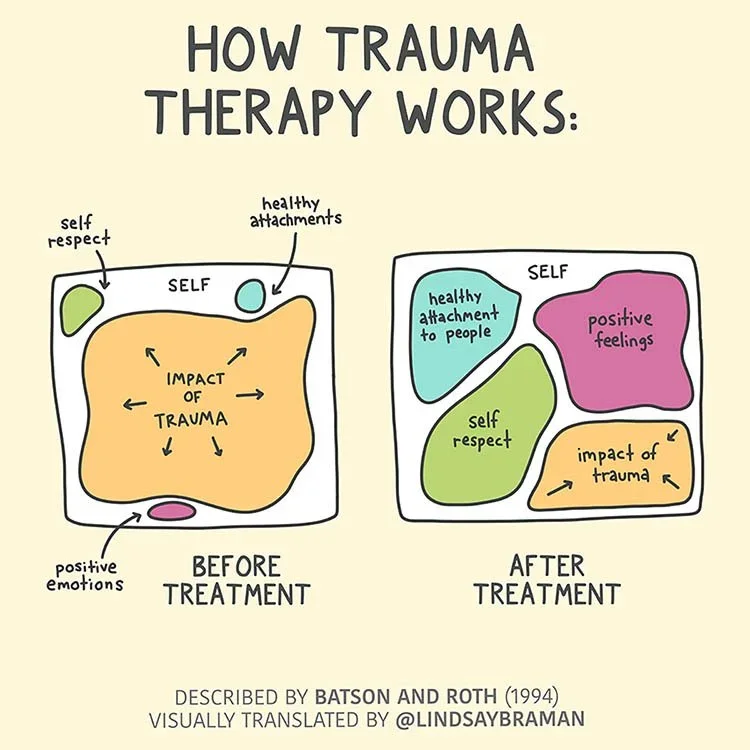Trauma-Informed Care: What to Expect from Therapy in Connecticut
Finding healing through compassionate, evidence-based trauma therapy in Newington and throughout Connecticut
When you've experienced trauma, taking the first step toward healing can feel overwhelming. If you're searching for "trauma therapy in CT" or wondering what trauma-informed care actually looks like, you're not alone. Understanding what to expect from therapy can help reduce anxiety and empower you to make informed decisions about your mental health journey.
Comfortable therapy office in Newington CT for trauma-informed care
What Is Trauma-Informed Care?
Trauma-informed care is an approach that recognizes the widespread impact of trauma and understands potential paths for recovery. Unlike traditional therapy models, trauma-informed care operates on the principle that therapists should ask "What happened to you?" rather than "What's wrong with you?"
This approach is built on six key principles:
Safety: Creating physical and emotional safety in the therapeutic environment Trustworthiness and Transparency: Building trust through clear communication and consistent boundaries Peer Support: Incorporating shared experiences and mutual self-help as vehicles for healing Collaboration and Mutuality: Leveling power differences and sharing decision-making Empowerment: Prioritizing your strengths, resilience, and ability to heal Cultural, Historical, and Gender Issues: Recognizing and addressing bias and stereotypes
Types of Trauma Therapy Available in Connecticut
Connecticut residents have access to various evidence-based trauma therapies. Here are some of the most effective approaches:
EMDR (Eye Movement Desensitization and Reprocessing)
EMDR therapy helps process traumatic memories by using bilateral stimulation (typically eye movements) while recalling distressing events. This approach has strong research support for treating PTSD and other trauma-related conditions.
Somatic Therapy in CT
Somatic therapy recognizes that trauma is stored in the body, not just the mind. This body-based approach helps you reconnect with physical sensations and release trauma held in your nervous system. Many Connecticut therapists integrate somatic techniques like:
Body awareness exercises
Breathing techniques
Movement and gesture work
Nervous system regulation practices
Cognitive Processing Therapy (CPT)
CPT helps you examine and change unhelpful thoughts related to your trauma. This structured approach is particularly effective for PTSD and can help you develop a more balanced understanding of your traumatic experience.
Internal Family Systems (IFS)
IFS views the mind as naturally consisting of different "parts" and helps you access your core Self to heal wounded parts affected by trauma.
Types of trauma therapy offered in Connecticut
What to Expect in Your First Trauma Therapy Session in Connecticut
Your first session with a trauma-informed therapist in Connecticut will likely focus on:
Building Safety and Trust
Your therapist will prioritize creating a safe space where you feel comfortable sharing at your own pace. They'll explain their approach, discuss confidentiality, and answer any questions about the therapeutic process.
Assessment and History
You'll discuss your reasons for seeking therapy, your trauma history (only what you're comfortable sharing), and your current symptoms or challenges. This isn't about reliving traumatic events in detail – it's about understanding how trauma may be affecting your daily life.
Collaborative Treatment Planning
Together, you'll identify your goals for therapy and discuss which approaches might be most helpful for your specific needs. Your therapist will explain different treatment options available in Connecticut and why they might recommend certain techniques.
Establishing Coping Resources
Before diving into trauma processing, your therapist will help you develop or strengthen coping skills and emotional regulation techniques. This foundation is crucial for safe trauma work.
Signs You Might Benefit from Trauma Therapy
Many people in Connecticut seek trauma therapy when they notice:
Persistent nightmares or flashbacks
Avoiding places, people, or situations that remind you of traumatic events
Feeling emotionally numb or disconnected from others
Difficulty sleeping or concentrating
Hypervigilance or feeling constantly "on edge"
Unexplained physical symptoms like headaches or stomach issues
Difficulty trusting others or maintaining relationships
Substance use as a way to cope with difficult emotions
Finding Trauma-Informed Therapists in Newington and Connecticut
When searching for "therapy for trauma in CT," consider these factors:
Credentials and Training
Look for licensed therapists with specialized training in trauma treatment. Many Connecticut therapists have additional certifications in EMDR, somatic therapy, or other trauma-specific modalities.
Therapeutic Approach
Consider what type of therapy resonates with you. Some people prefer talk-based approaches, while others benefit from body-based or creative therapies.
Location and Accessibility
Whether you're in Newington, Hartford, New Haven, or anywhere in Connecticut, consider factors like:
Distance from your home or work
Parking availability
Public transportation access
Telehealth options for ongoing sessions
Insurance and Payment Options
Many Connecticut trauma therapists accept major insurance plans. Always verify coverage for mental health services and understand your copay or deductible requirements.
The Healing Journey: What to Expect Long-Term
Trauma therapy isn't a quick fix, but it can lead to profound healing. Here's what many clients experience:
Initial Stabilization (Weeks 1-8)
Focus on building coping skills, establishing safety, and developing a strong therapeutic relationship. You might notice improved sleep, reduced anxiety, or better emotional regulation.
Processing and Integration (Months 2-12+)
Once you feel stable, you'll begin processing traumatic memories in a safe, controlled way. This phase can be challenging but is often when the most significant healing occurs.
Reconnection and Growth (Ongoing)
As trauma symptoms decrease, you'll focus on rebuilding relationships, pursuing meaningful activities, and developing a renewed sense of purpose and connection.
Trauma support group meeting in Connecticut
Supporting Your Trauma Recovery in Connecticut
Connecticut offers numerous resources to support your healing journey:
Community Support Groups
Many areas, including Newington and surrounding towns, offer trauma survivor support groups through community centers, hospitals, and mental health organizations.
Complementary Healing Practices
Consider incorporating practices like yoga, meditation, or massage therapy alongside your trauma therapy. Connecticut has many qualified practitioners who understand trauma-sensitive approaches.
Crisis Resources
If you're in crisis, Connecticut has 24/7 resources available including the 988 Suicide & Crisis Lifeline and local crisis intervention services.
Taking the Next Step
If you're ready to begin trauma therapy in Connecticut, remember that seeking help is a sign of strength, not weakness. Trauma-informed care offers a path toward healing that honors your resilience while providing professional support for your recovery.
Your journey may not be linear, and that's completely normal. With the right trauma-informed therapist and approach, you can develop the tools needed to process your experiences, reduce symptoms, and reclaim your sense of safety and empowerment.
Whether you're dealing with recent trauma or addressing experiences from years ago, trauma-informed care in Connecticut can help you move from surviving to thriving. The first step is reaching out – and that step takes tremendous courage.
Ready to Begin Your Healing Journey?
If you're looking for compassionate, evidence-based trauma therapy in Connecticut, we're here to help. Contact us today to learn more about our trauma-informed approach and how we can support your path to healing.
Remember: This blog post is for informational purposes only and is not a substitute for professional medical advice, diagnosis, or treatment. Always seek the advice of qualified healthcare providers with questions about your mental health.



